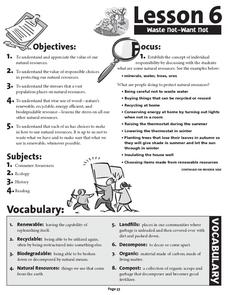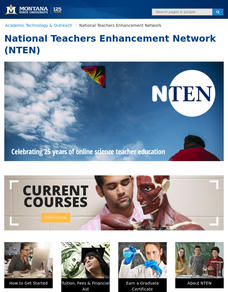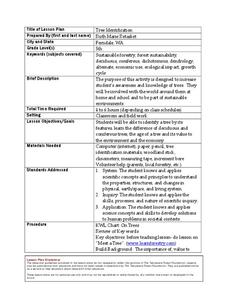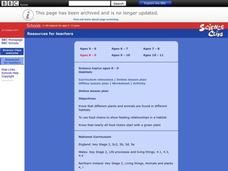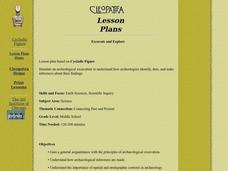Curated OER
Waste Not Want Not
Students are introduced to the need to save natural resources. Through inquiry, hands-on activities, and problem solving, students increase their understanding of solid waste materials and the need to reduce, recycle, and reuse.
Curated OER
Plants In Space
In this biology instructional activity, students grow corn plants in growth pouches as the control group in an experiment on plant growth in microgravity. Then they analyze any differences that occur between Earth-grown and space-grown...
Curated OER
Reflection and Absorption of Light
Students use a microcomputer connected to a light sensor and temperature probe to explore the reflection and absorption of radiation for different surfaces. Students follow instructions in this guided inquiry based lab and are then asked...
Curated OER
Demonstrating Erosion in Action
Students easure and record volume of water, then measure and record mass of soil. They explain the effects of the following in controlling erosion: Contouring, cover crop, strip cropping, reforestation, inter-seeding.
US Environmental Protection Agency
Carbon Through the Seasons
Meteorologists view an animated video by the Environmental Protection Agency to learn how the carbon cycle works, and then move into groups to analyze and graph actual data of the atmospheric carbon dioxide concentration from Hawaii's...
Curated OER
What Is Natural?
Your junior highers will learn about which objects are natural and classify objects as abiotic or biotic. Your class will trace human products to their natural resources using matter cycles and then create their own definition of nature.
Curated OER
Sediment Tubes
Students observe how different density soils and rocks behave in wind and in water. They make predictions and careful observations as they explore sediment transport and sediment rates in streams and rivers.
Curated OER
Creeping
Learners observe, measure, and graph a model of slow down slope movement representing soil creep. This task assesses students' abilities to collect, record, and organize data, set up graph axes, plot data points, draw line graphs, apply...
Curated OER
Permafrost: Permanently Frozen Ground
Students explore permafrost. In this 3 states of matter lesson, students identify characteristics of solids and liquids. Students observe water and soil melting and freezing at various temperatures. Students make predictions about a...
Curated OER
The Bulbs: Camas and Daffodil
Fourth graders become aware of the importance of the camas bulb to the Nez Perce people, they learn the parts of plants, and gain understanding of the interdependence of Nature. They study about the possible causes and outcomes of global...
Curated OER
Tree Identification
Students list four ways to identify trees. In this tree identification instructional activity, students use tree identification techniques such as leafs, bark, wood grain, soil type, and climate to create tables and graphs.
Curated OER
Habitats
Students investigate the habitats of living things and the cycle of the food chain. In this scientific inquiry online lesson, students examine the habitats of plants and animals as well as the food chain as they sort pictures of living...
Curated OER
Rock Cycles, Crayon Cycles
Students examine the rock cycle and the path that rocks go through to rearranged in different ways. They define key vocabulary terms, then in small groups conduct a variety of experiments using crayon shavings as simulated rocks and...
Curated OER
Dirty Decomposers
Learners explore the ecosystem by conducting a ziploc bag experiment. In this recycling lesson, students identify decomposer organisms in our environment and how they speed up the recycling process. Learners utilize a ziploc plastic bag,...
Curated OER
An Investigation into Effects of Rhizobium Soil Bacteria on Nitrogen Availability
Young scholars identify the control and the variables in the experiment. They describe the growth of plants with and without nitrogen fixing bacteria, then name the bacterium responsible for making nitrogen available to the plant.
Curated OER
What are Rocks and Minerals? How can they help us?
Sixth graders investigate the difference between rocks and minerals. They name the three kinds of rocks (sedimentary, igneous, and metamorphic) and know the differences between them.
Curated OER
Excavate and Explore
Students simulate an archeological excavation to explain how archeologists identify, date, and make inferences about their findings. They explain the importance of spatial and stratigraphic contexts in archaeology.
Curated OER
Particulate Matter in the Air
Learners conduct an inquiry exploring the different kinds of particulate matter in the air. They name three different types of particulate matter found in the air and identify different types of solid particulate matter found in the air...
Curated OER
Pet Rocks
Students complete a variety of activities related to the physical characteristics of minerals. They classify and group candy, classify rocks and complete a Pet River Rock worksheet. Students try to guess which rock goes with each...
Curated OER
Rocks, Minerals, and Erosion
Fourth graders describe the difference between minerals (composed of the same substance throughout) and rocks (composed of two or more minerals). They recognize that there are three classes of rocks: igneous, sedimentary, and metamorphic
Curated OER
Barnegat Bay Watershed
Students design a model watershed. In this watershed lesson, students learn the needed parts of a watershed and how they work. Students evaluate how watersheds effect communities.
Curated OER
Worms in a Bottle
Students gain a better understanding of the worm and its role in the recycling of organic materials into simpler forms by constructing worm bottles and observing for 60 to 90 days.
Curated OER
Life in a Cup
Third graders make and maintain a mini terrarium. They keep a daily journal of what happens in their terrarium and record daily observations and measurements.
Curated OER
Minerals
Students apply rules to compare and rank the hardness and softness of minerals. They perform a scratch test on four unknown mineral samples, read a bar graph that illustrates the comparative hardness and softness of four named minerals,...


